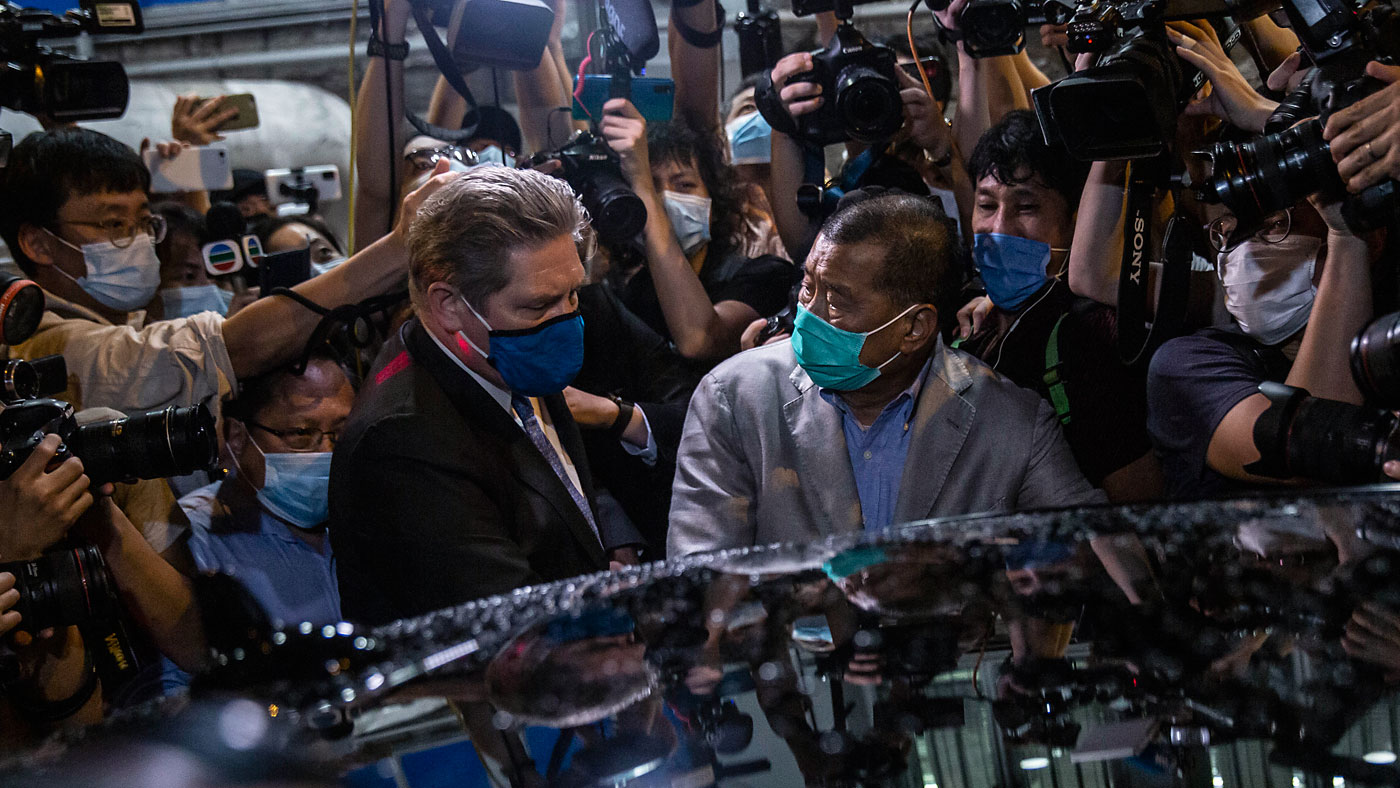Sharing the pain: Hong Kong protesters invest in arrested mogul’s pro-democracy newspaper
Supports of campaigner Jimmy Lai are buying stocks in his media company

A free daily email with the biggest news stories of the day – and the best features from TheWeek.com
You are now subscribed
Your newsletter sign-up was successful
Pro-democracy campaigners in Hong Kong are flexing their economic muscles to strike back at Beijing following the arrest of media mogul and activist activist Jimmy Lai.
“Mr Lai, whose Apple Daily tabloid is known for its vocal criticism of the Chinese and Hong Kong governments, has been accused of crimes including colluding with foreign forces,” the Financial Times reports. He was released on bail this morning after being detained under draconian new security laws on Monday.
Shares in his company, Next Digital, initially dropped on news of his arrest. But just hours later, they “rocketed as online pro-democracy activists called on investors to snap up the shares”, the newspaper continues.
The Week
Escape your echo chamber. Get the facts behind the news, plus analysis from multiple perspectives.

Sign up for The Week's Free Newsletters
From our morning news briefing to a weekly Good News Newsletter, get the best of The Week delivered directly to your inbox.
From our morning news briefing to a weekly Good News Newsletter, get the best of The Week delivered directly to your inbox.
“At its highest point, the stock had surged nearly 2,200%,” Quartz reports. “The rally has boosted the company’s market value from around HK$238m [£24m] to $2.9bn [£2.2bn].”
The exponential growth ran out of steam earlier today, however, when Hong Kong’s financial regulator said it would investigate the stock’s performance.
“Brokers said concerns that the Securities and Futures Commission might halt trading prompted the sell-off,” Reuters reports.
Lai’s supporters have also been expressing their support in more traditional ways, “lining up at news stands across the city” to buy a copy of his newspaper “in a bid to help the publication - and press freedom - survive”, says Press Gazette.
A free daily email with the biggest news stories of the day – and the best features from TheWeek.com
The paper reported losses of more than £40m last financial year, adds Quartz, in part due to “a years-long boycott by advertisers wary of the paper’s politics”.
Lai is the most prominent victim yet of Hong Kong’s new national security laws, which came into force in June. Pro-democracy activist Joshua Wong said at the time that the legislation marked “the end of Hong Kong that the world knew before”.
Holden Frith is The Week’s digital director. He also makes regular appearances on “The Week Unwrapped”, speaking about subjects as diverse as vaccine development and bionic bomb-sniffing locusts. He joined The Week in 2013, spending five years editing the magazine’s website. Before that, he was deputy digital editor at The Sunday Times. He has also been TheTimes.co.uk’s technology editor and the launch editor of Wired magazine’s UK website. Holden has worked in journalism for nearly two decades, having started his professional career while completing an English literature degree at Cambridge University. He followed that with a master’s degree in journalism from Northwestern University in Chicago. A keen photographer, he also writes travel features whenever he gets the chance.
-
 El Paso airspace closure tied to FAA-Pentagon standoff
El Paso airspace closure tied to FAA-Pentagon standoffSpeed Read The closure in the Texas border city stemmed from disagreements between the Federal Aviation Administration and Pentagon officials over drone-related tests
-
 Political cartoons for February 12
Political cartoons for February 12Cartoons Thursday's political cartoons include a Pam Bondi performance, Ghislaine Maxwell on tour, and ICE detention facilities
-
 Arcadia: Tom Stoppard’s ‘masterpiece’ makes a ‘triumphant’ return
Arcadia: Tom Stoppard’s ‘masterpiece’ makes a ‘triumphant’ returnThe Week Recommends Carrie Cracknell’s revival at the Old Vic ‘grips like a thriller’
-
 Epstein files topple law CEO, roil UK government
Epstein files topple law CEO, roil UK governmentSpeed Read Peter Mandelson, Britain’s former ambassador to the US, is caught up in the scandal
-
 Iran and US prepare to meet after skirmishes
Iran and US prepare to meet after skirmishesSpeed Read The incident comes amid heightened tensions in the Middle East
-
 Israel retrieves final hostage’s body from Gaza
Israel retrieves final hostage’s body from GazaSpeed Read The 24-year-old police officer was killed during the initial Hamas attack
-
 China’s Xi targets top general in growing purge
China’s Xi targets top general in growing purgeSpeed Read Zhang Youxia is being investigated over ‘grave violations’ of the law
-
 Panama and Canada are negotiating over a crucial copper mine
Panama and Canada are negotiating over a crucial copper mineIn the Spotlight Panama is set to make a final decision on the mine this summer
-
 Why Greenland’s natural resources are nearly impossible to mine
Why Greenland’s natural resources are nearly impossible to mineThe Explainer The country’s natural landscape makes the task extremely difficult
-
 Iran cuts internet as protests escalate
Iran cuts internet as protests escalateSpeed Reada Government buildings across the country have been set on fire
-
 US nabs ‘shadow’ tanker claimed by Russia
US nabs ‘shadow’ tanker claimed by RussiaSpeed Read The ship was one of two vessels seized by the US military